-
 Bitcoin
Bitcoin $103,243.7406
3.45% -
 Ethereum
Ethereum $2,335.3701
20.03% -
 Tether USDt
Tether USDt $0.9999
-0.03% -
 XRP
XRP $2.3932
8.33% -
 BNB
BNB $633.7730
3.06% -
 Solana
Solana $168.4639
8.84% -
 USDC
USDC $1.0001
0.01% -
 Dogecoin
Dogecoin $0.2074
12.81% -
 Cardano
Cardano $0.7919
9.96% -
 TRON
TRON $0.2592
3.07% -
 Sui
Sui $3.9942
6.90% -
 Chainlink
Chainlink $16.1425
8.53% -
 Avalanche
Avalanche $23.1914
10.37% -
 Stellar
Stellar $0.3033
10.18% -
 Shiba Inu
Shiba Inu $0.0...01541
14.48% -
 Hedera
Hedera $0.2020
8.09% -
 Hyperliquid
Hyperliquid $25.0754
14.00% -
 Bitcoin Cash
Bitcoin Cash $413.4478
-0.41% -
 Toncoin
Toncoin $3.2709
4.75% -
 UNUS SED LEO
UNUS SED LEO $8.7352
-0.75% -
 Litecoin
Litecoin $98.2522
6.16% -
 Polkadot
Polkadot $4.6469
8.95% -
 Monero
Monero $304.6089
2.04% -
 Pepe
Pepe $0.0...01308
41.65% -
 Dai
Dai $1.0001
-0.01% -
 Pi
Pi $0.7540
21.13% -
 Bitget Token
Bitget Token $4.5203
4.24% -
 Ethena USDe
Ethena USDe $1.0002
-0.02% -
 Uniswap
Uniswap $6.3627
22.19% -
 Bittensor
Bittensor $431.6840
6.74%
What ecosystem does Status(SNT) currency belong to?
The Status Network belongs to the Ethereum blockchain ecosystem and utilizes the SNT token as its native currency.
Dec 09, 2024 at 02:18 am
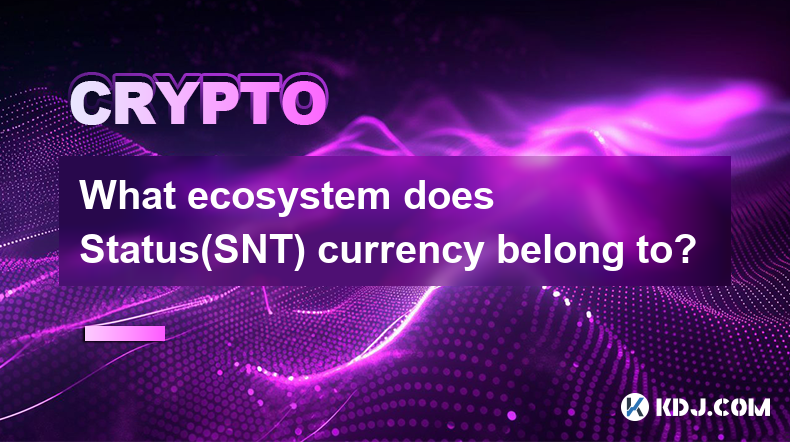
What Ecosystem Does Status (SNT) Currency Belong To?
Status (SNT) is a decentralized messaging application that aims to provide a secure and private platform for communication. The Status Network is built on the Ethereum blockchain and uses the SNT token as its native currency. The Status Network ecosystem includes a variety of services and applications that are designed to enhance the user experience and make it easier for people to communicate and transact securely.
What is the Status Network?
The Status Network is a decentralized, open-source network that provides a variety of communication and messaging services. The network is built on the Ethereum blockchain, which provides a secure and tamper-proof foundation for the network. The Status Network is designed to be censorship resistant, meaning that it cannot be blocked or censored by any central authority.
What is the SNT Token?
The SNT token is the native currency of the Status Network. The token is used to pay for goods and services within the network, such as messaging, storage, and bandwidth. The SNT token can also be used to participate in the governance of the Status Network, such as voting on proposals and electing delegates.
What are the Benefits of Using the Status Network?
There are a number of benefits to using the Status Network, including:
- Security: The Status Network is built on the Ethereum blockchain, which provides a secure and tamper-proof foundation for the network. This makes it difficult for hackers to steal or compromise user data.
- Privacy: The Status Network is designed to be privacy-preserving, meaning that it does not collect or store any user data. This makes it a safe and secure place to communicate.
- Censorship resistance: The Status Network is decentralized, meaning that it is not controlled by any central authority. This makes it resistant to censorship and gives users the freedom to communicate without fear of reprisal.
- Ease of use: The Status Network is designed to be easy to use. The app is available for free on both iOS and Android devices, and it is simple to set up and use.
- Cross-platform compatibility: The Status Network is cross-platform compatible, meaning that it can be used on a variety of devices, including smartphones, tablets, and computers.
What are the Different Services Available on the Status Network?
The Status Network provides a variety of services and applications, including:
- Messaging: The Status app is a secure and private messaging app that allows users to send text, voice, and video messages. The app also supports group chats and encrypted messaging.
- Storage: The Status Network provides decentralized storage for users' data. This allows users to store their data securely and without fear of it being compromised or lost.
- Bandwidth: The Status Network provides decentralized bandwidth for users. This allows users to access the internet without having to rely on a traditional ISP.
- Dapps: The Status Network supports a variety of decentralized applications (dapps). These dapps provide users with access to a range of services, such as financial services, gaming, and social media.
What are the Future Plans for the Status Network?
The Status Network is constantly evolving and adding new features and services. Some of the future plans for the network include:
- Integration with other blockchains: The Status Network is currently working on integrating with other blockchains, such as Bitcoin and Polkadot. This will allow users to access a wider range of services and applications.
- Development of new dapps: The Status Network is also working on developing new dapps for the network. These dapps will provide users with access to a wider range of services, such as decentralized finance, prediction markets, and gaming.
- Expansion of the team: The Status Network is also planning to expand its team. This will allow the network to develop more features and services at a faster pace.
Conclusion
The Status Network is a decentralized, open-source network that provides a variety of communication and messaging services. The network is built on the Ethereum blockchain and uses the SNT token as its native currency. The Status Network is designed to be secure, private, censorship resistant, and easy to use. The network also supports a variety of services and applications, including messaging, storage, bandwidth, and dapps. The Status Network is constantly evolving and adding new features and services. The future plans for the network include integration with other blockchains, development of new dapps, and expansion of the team.
Disclaimer:info@kdj.com
The information provided is not trading advice. kdj.com does not assume any responsibility for any investments made based on the information provided in this article. Cryptocurrencies are highly volatile and it is highly recommended that you invest with caution after thorough research!
If you believe that the content used on this website infringes your copyright, please contact us immediately (info@kdj.com) and we will delete it promptly.
- Dogecoin Price is Climbing toward $0.20
- 2025-05-09 19:05:14
- Dogecoin (DOGE) Price Prediction: What's Driving DOGE's Current Price Surge?
- 2025-05-09 19:05:14
- Sui (SUI) Integrates with Axelar Network to Unlock Cross-Chain Interoperability
- 2025-05-09 19:00:13
- Bitcoin (BTC) Reaches the Psychological Price Level of $100,000
- 2025-05-09 19:00:13
- Pectra: Ethereum Takes a Transformative Leap Forward, Opening New Markets and Redefining the Stack
- 2025-05-09 18:55:12
- Coinbase Q1:- The leading crypto exchange Coinbase has released it Quarterly report for Q1 2025.
- 2025-05-09 18:55:12
Related knowledge
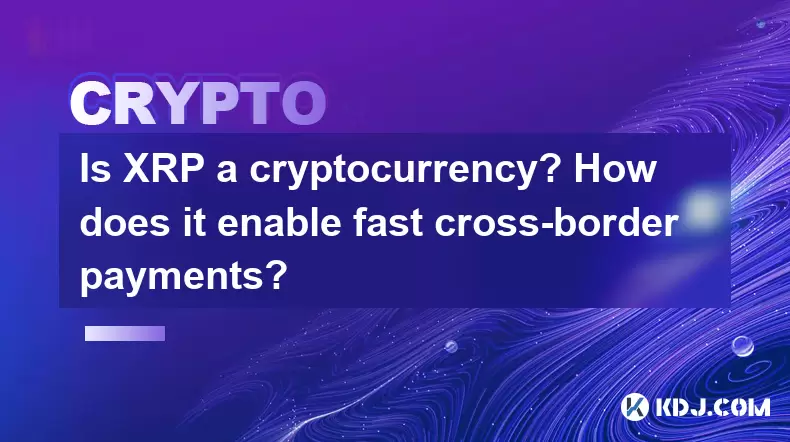
Is XRP a cryptocurrency? How does it enable fast cross-border payments?
May 09,2025 at 04:21pm
Is XRP a cryptocurrency? How does it enable fast cross-border payments? XRP is indeed a cryptocurrency, and it plays a significant role in facilitating fast cross-border payments. Created by Ripple Labs, XRP is designed to serve as a bridge currency in international transactions, enabling quick and cost-effective transfers between different currencies. ...
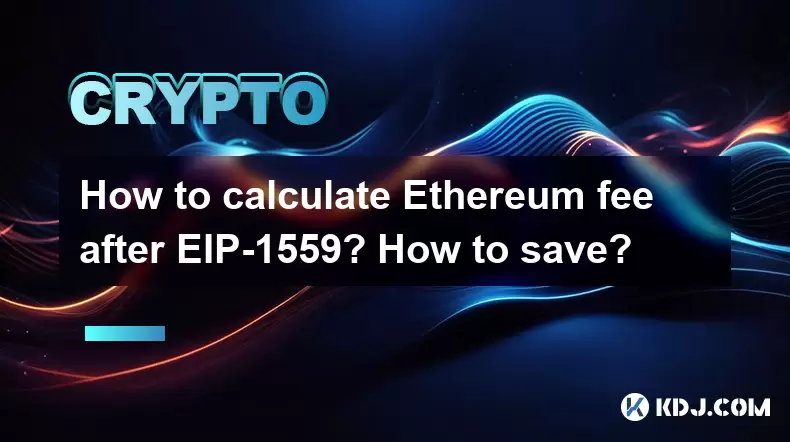
How to calculate Ethereum fee after EIP-1559? How to save?
May 09,2025 at 08:01am
The introduction of EIP-1559 in August 2021 brought significant changes to the Ethereum network's fee structure, revolutionizing how users interact with transaction costs. This article will delve into the specifics of how to calculate Ethereum fees post-EIP-1559 and offer strategies to save on these fees. Understanding EIP-1559 and its ComponentsEIP-155...
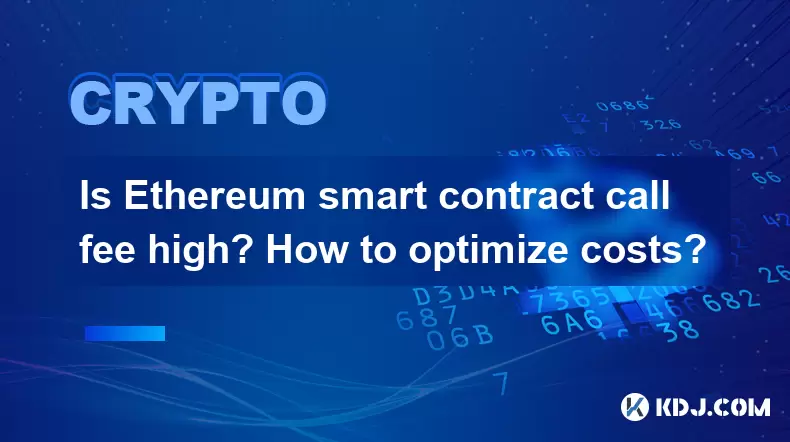
Is Ethereum smart contract call fee high? How to optimize costs?
May 08,2025 at 09:35am
Is Ethereum Smart Contract Call Fee High? How to Optimize Costs? The world of Ethereum smart contracts has revolutionized the way we think about decentralized applications and blockchain technology. However, one of the most frequently discussed topics within this realm is the cost associated with executing smart contract calls. In this article, we will ...
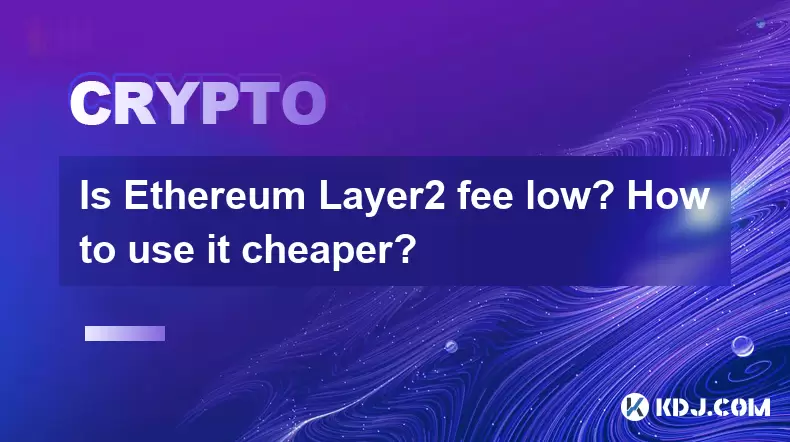
Is Ethereum Layer2 fee low? How to use it cheaper?
May 08,2025 at 03:56am
The question of whether Ethereum Layer 2 solutions offer lower fees and how to use them more economically is a topic of great interest within the cryptocurrency community. Ethereum's Layer 2 solutions have been developed to address the high transaction fees and scalability issues associated with the main Ethereum network. In this article, we will delve ...

How to calculate Ethereum network fee? How to reduce transaction costs?
May 08,2025 at 02:15am
Understanding and managing Ethereum network fees is crucial for anyone involved in transactions on the Ethereum blockchain. The network fee, also known as gas fee, is the amount of Ether (ETH) required to successfully conduct a transaction or execute a smart contract on the Ethereum network. Calculating these fees and finding ways to reduce them can sig...
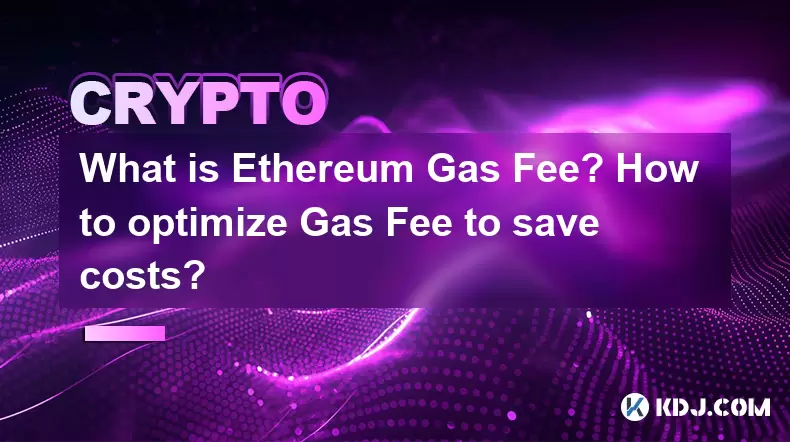
What is Ethereum Gas Fee? How to optimize Gas Fee to save costs?
May 08,2025 at 03:43am
Ethereum gas fees are a crucial aspect of interacting with the Ethereum blockchain. Understanding and optimizing these fees can significantly impact the cost-effectiveness of transactions and smart contract interactions. In this article, we will delve into what Ethereum gas fees are, how they are calculated, and provide detailed strategies for optimizin...

Is XRP a cryptocurrency? How does it enable fast cross-border payments?
May 09,2025 at 04:21pm
Is XRP a cryptocurrency? How does it enable fast cross-border payments? XRP is indeed a cryptocurrency, and it plays a significant role in facilitating fast cross-border payments. Created by Ripple Labs, XRP is designed to serve as a bridge currency in international transactions, enabling quick and cost-effective transfers between different currencies. ...

How to calculate Ethereum fee after EIP-1559? How to save?
May 09,2025 at 08:01am
The introduction of EIP-1559 in August 2021 brought significant changes to the Ethereum network's fee structure, revolutionizing how users interact with transaction costs. This article will delve into the specifics of how to calculate Ethereum fees post-EIP-1559 and offer strategies to save on these fees. Understanding EIP-1559 and its ComponentsEIP-155...

Is Ethereum smart contract call fee high? How to optimize costs?
May 08,2025 at 09:35am
Is Ethereum Smart Contract Call Fee High? How to Optimize Costs? The world of Ethereum smart contracts has revolutionized the way we think about decentralized applications and blockchain technology. However, one of the most frequently discussed topics within this realm is the cost associated with executing smart contract calls. In this article, we will ...

Is Ethereum Layer2 fee low? How to use it cheaper?
May 08,2025 at 03:56am
The question of whether Ethereum Layer 2 solutions offer lower fees and how to use them more economically is a topic of great interest within the cryptocurrency community. Ethereum's Layer 2 solutions have been developed to address the high transaction fees and scalability issues associated with the main Ethereum network. In this article, we will delve ...

How to calculate Ethereum network fee? How to reduce transaction costs?
May 08,2025 at 02:15am
Understanding and managing Ethereum network fees is crucial for anyone involved in transactions on the Ethereum blockchain. The network fee, also known as gas fee, is the amount of Ether (ETH) required to successfully conduct a transaction or execute a smart contract on the Ethereum network. Calculating these fees and finding ways to reduce them can sig...

What is Ethereum Gas Fee? How to optimize Gas Fee to save costs?
May 08,2025 at 03:43am
Ethereum gas fees are a crucial aspect of interacting with the Ethereum blockchain. Understanding and optimizing these fees can significantly impact the cost-effectiveness of transactions and smart contract interactions. In this article, we will delve into what Ethereum gas fees are, how they are calculated, and provide detailed strategies for optimizin...
See all articles






















































































